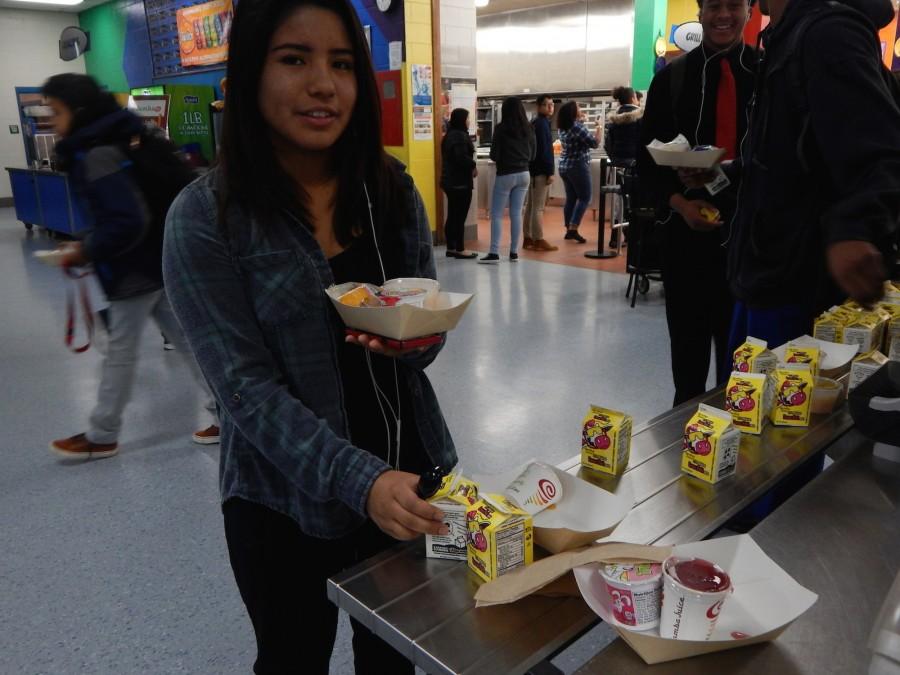Cartons of unopened milk go to waste in cafeteria
To receive federal funds, district must follow USDA policy
Sophomore Adamaris Chimbo Loja says she’s not a milk drinker, so the mandatory carton given to her at breakfast is left on the condiment station.
February 9, 2016
A new state law that requires districts to give every student a carton of milk and a fruit during breakfast is experiencing student backlash here at the high school.
Danbury Public Schools craft its meal agendas under the guidelines of the National School Lunch Program and School Breakfast Program, which are U.S. Department of Agriculture initiatives.
In exchange for federal financial assistance, dietary specifications for calories, fats, sodium, etc., must be thoroughly followed.
As of July 1, 2015, the USDA mandated a new meal pattern policy for the 2015-16 school year.
Following this breakfast policy, each K-12 student must take a fruit, a carton of milk, and a “grain” entree item such as waffles or pancakes to be compliant. Whether they want it or not.
“It is the hope of the USDA that students will take all of the components to ensure a balanced meal, which in turn helps with learning” said Barry Mollengarden, general manager of the district’s School Lunch Program.
Often times, however, students leave the unopened cartons of milk on their tables or drop them off at condiment station of the cafeteria instead of drinking it. The unused cartons are then gathered into milk crates to be thrown out.
Milk is either included with the meal or available for 50 cents.
“I hate the new law,” expressed sophomore Safia Burke.
“I don’t understand why we are forced to take a carton of milk when all we do is either throw it out or leave it around the cafe,” she stated.
Now, this often leads to the question, what is done with the remainder of the untouched milk?
Any item that is sold cannot be accepted back into the kitchens for re-sale or storage. This is because the cafeteria is no longer responsible after the items are sold.
“We regularly meet with a student advisory committee at the high school and previously discussed doing a recycling program led by high school students and staff for unwanted milks and fruits,” stated Mollengarden.
Unfortunately, while the program was well received, it was never fully implemented. Rather, the milk cartons are recycled along with the regular trash.
“I feel that forcing students to take milk is extremely wasteful,” said sophomore Elisabeth Kelly.
“Rather than requiring students to take milk, it should be optional. That way, less goes to waste,” she said.
This view is shared amongst several of the students who are served breakfast here at the high school.
“I don’t agree with the rule,” said Alexandra Charles, sophomore.
“Honestly they see kids throwing it out right after we get out of the line. I don’t think it’s okay to be forced to take a milk or a fruit if it’s going to be thrown out afterwards,” she explained.
Another USDA guideline, which states that lunch cannot be served before 10 a.m., is also causing trouble for some students and faculty who used to be able to go through the line before that time.
Students are lining up for lunch during third period have to wait until the bell rings for fourth period. The line is so long by then, it takes a while to get everyone served.
“Since Danbury High School has its first lunch period that starts at 9:55 a.m., we cannot serve until 10 a.m. This is because the cafeteria staff is prepped and ready to serve the students at 10 a.m.,” explained Mollengarden.
However, the student advisory committee has already requested a variance from this policy and is awaiting approval.
This proposal has excited many students who continue to hope for a different approach when it comes to serving breakfast and lunch.
“I hope these reactions from the student body prompt changes in our cafeteria rules so we can reduce waste, but continue to receive balanced meals,” Kelly said.




































Lisa • Dec 23, 2016 at 7:53 pm
This is so real and true. Schools should not serve American kids this and they don’t even want it. I never want milk in high school and only drank chocolate milk in elementary because when there were no other options. It’s sad the government forces this drink on children who don’t even like it. Some schools won’t even let you substitute juice for milk without a medical notice.